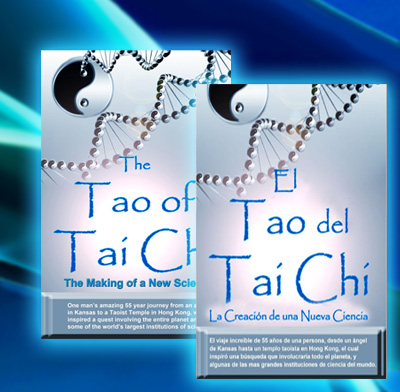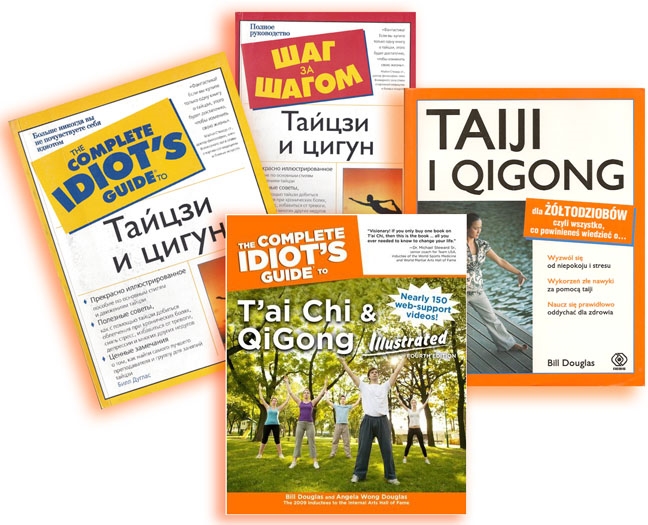aNXIETY and Tai Chi & qigong
ANXIETY:
Harvard Health
Publications
Anxiety/Depression. A growing number
of studies support the positive impact of Tai Chi on many
aspects of psychological well-being. Dr. Chenchen Wang of
Tufts University School of Medicine identified 40 studies
conducted both in the West and in China that included an
evaluation of Tai Chi for psychological outcomes. ... The
review concluded that Tai Chi appears to be associated with
improvements in stress, anxiety, depression, mood, and
increased self-esteem. (Harvard Medical School Guide to Tai
Chi. Page 206.)
Read more at Harvard Health Publications
...
Alternative Therapies Can Be Safe,
Effective For Children
By: PR Newswire
Apr. 6,
2009 08:10 AM"There is a huge place for complementary and
alternative medicine in pediatrics," says Dolores Mendelow,
M.D., clinical assistant professor of pediatrics and
communicable diseases at the University of Michigan Medical
School.
Complementary and alternative therapies are
becoming a more prevalent treatment for children. If
individuals follow the directions of their physicians, these
treatments are a safe and effective way to get and stay
healthy, Mendelow says.
Tai chi. Research shows
teenagers encounter a lot of stress, which puts them at risk
for depression. Mind and body therapies, such as tai chi, help
reduce the risk of depression and anxiety. Tai chi and yoga
help to decrease blood pressure and sympathetic activity in
children. This allows for a sense of relaxation and calmness.
Anxiety, Depression & Tai Chi Therapy
JOURNAL OF PSYCHOSOMATIC RESEARCH, 1989, VOL ID 23,
ISSUE ID 2, PAGES 197-206
Relative to measurement
beforehand, practice of T'ai Chi raised heart rate, increased
nonadrenaline excretion in urine, and decreased salivary
cortisol concentration. Relative to baseline levels, [Test
Subjects] reported less tension, depression, anger, fatigue,
confusion and state-anxiety; they felt more vigorous, and in
general they had less total mood disturbance.
Nursing Journal, 2002, Vol. 32, Issue 12,
page 86
The physical and psychological benefits of tai chi
chuan are discussed. Tai chi can be used as a therapeutic tool
for improving coordination, posture and flexibility and it
also can be used to reduce anxiety, depression. It is also an
excellent way to handle stress.
The Brown
University Digest of Addiction Theory and Application,
2002, Vol 21, Issue 3, Page S1 [producers note: given Tai Chi
is a form of Qigong, and they share common benefits, this
qigong study with heroin addicts and anxiety, seems relevant
to this discussion on anxiety.]
The researchers
determined that reduction of withdrawal symptoms occurred more
rapidly in the qigong group compared with the patients in
the lofexidine-treated group and the nontreatment control
group. From day one of the intervention, patients in the
qigong group had significantly lower mean symptom scores that
the other two groups (p<0.01). The qigong and medication
groups had lower anxiety scores than the nontreatment group
(p<0.01); the qigong group had significantly lower anxiety
scores than the lofexidine-treated group (p<0.01).
American Journal of Chinese Medicine, 1981,
Vol 9, Issue 1, Pages 1-14
Psychological homeostasis refers
to emotional control or tranquility. It has been stated that
the biological function of human emotion and repression is
primarily homeostatic. Evidence suggests that a feedback
relationship exists between forms of homeostasis, and the
body-mind type of therapies (including acupuncture and T'ai
Chi) thus have a combined physiological, physical, and
psychological effect.
FIND MUCH MORE RESEARCH AT THE "QIGONG
INSTITUTE DATABASE"
Since 1984, collecting
breaking medical/science research on Qigong, Tai Chi, Yoga,
and Mind-Body Education
Click here
for Qigong Institute Database...
* NOTE: World Tai Chi & Qigong Day advises
consulting your physician before beginning any new exercise,
herbal, diet, or health program. The research listed here is
meant to stimulate a discussion between you and your
physician, health insurance carrier, etc., not as medical
advise. Research and comments provided here are hoped to
stimulate a more robust discussion of powerful natural
mind/body health tools. Popular media, health media, and
government must increase attention to stunning emerging
research, including the UCLA study indicating Tai Chi
participants enjoyed a 50% increase in immune system
resistance to viral infection.
- To learn more about tai chi & qigong medical research,
see the below book,
"the complete idiot's guide to tai chi & qigong,", and also
"Harvard Medical School Guide to Tai Chi," and
"The way of qigong: the art and science of chinese energy healing."
Click to purchase this acclaimed best-selling Tai Chi book, with nearly 150 web-video support videos for the detailed text/illustration instruction as a "gift of health" for loved ones.
A new paradigm in multi-media educational books.
"Visionary! If you only buy one book on T'ai Chi, then this
is the book. This book is all you ever needed to know to
change your life. I have taught T'ai Chi for several decades
myself, yet I have now read Bill's book from cover to cover
seven times, and still get something new from it each time."
– Dr. Michael Steward Sr., D.MA, Ph.D., MA, Senior
Coach for Team USA, Inductee of the World Sports Medicine and
World Martial Arts Hall of Fame
"Sometimes Chinese
culture can be difficult to explain. Sifu Bill Douglas
successfully uses American culture to explain the art of T'ai
Chi Chuan. He simplifies difficult concepts, making them
easier to understand. This book takes the best parts of T'ai
Chi and makes them understandable [to Westerners] without
requiring a grounding in Chinese culture and history."
– Sifu Yijiao Hong, USA All-Tai Chi Grand Champion and USA
Team member; Certified International Coach and Judge,
International Wushu Federation
"Douglas has
achieved for QiGong what Apple did for the computer. He's
brought it to the people … great place to start for beginners.
… Teachers may also find this an excellent manual 'on how to
explain these concepts to the general public…'"
– R.
Poccia,
"The Tao of Tai Chi: The Making of a New Science" (now available in both English and Spanish))

Harvard's Dr. Peter Wayne discusses Tai Chi, Qigong and Bio-Energy with Neuro-biologist, Dr. Richard Hammerschlag,
with WORLD TAI CHI & QIGONG DAY ONLINE SUMMIT HOSTS
World Tai Chi & Qigong Day's series of Official ONLINE
SUMMITS, have brought some of the top minds in Tai Chi, Qigong,
and cutting edge scientists researching Mind-Body practices.
World Tai Chi & Qigong Day's global health education work was
recognized on page 25 of "The Harvard Medical School Guide to
Tai Chi" ...
A reflection of how successful the invasion
has been is World Tai Chi Day, organized by Bill Douglas. One of
the purposes of this day is ‘to bring together people across
racial, economic, religious, and geo-political boundaries, to
join together for the purpose of health and healing, providing
an example to the world.' Millions of people around the world –
65 nations participated in 2011 – gather one day each year to
celebrate the health and healing benefits of Tai Chi and Qigong.
— The Harvard Medical School Guide to Tai Chi (page 25)
Harvard Medical School Researchers Launch 'Tai Chi as Therapy' Lecture to Commemorate World Tai Chi Day
The new Harvard Medical School Guide to Tai Chi is a powerful
reference book for all tai chi and qigong advocates, teachers,
etc. The Harvard Guide cites WorldTaiChiDay.org's work in
expanding global awareness of tai chi and qigong!
Our
efforts have exposed over ONE BILLION potential viewers/readers
of mass media to Tai Chi and Qigong and its myriad health
benefits, via our annual WTCQD worldwide events.
